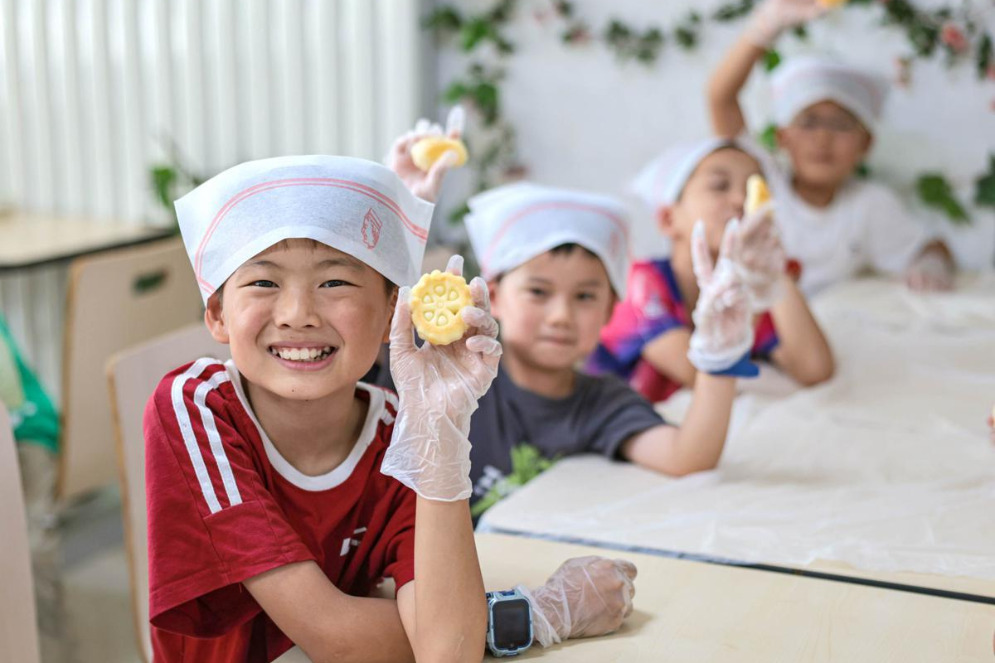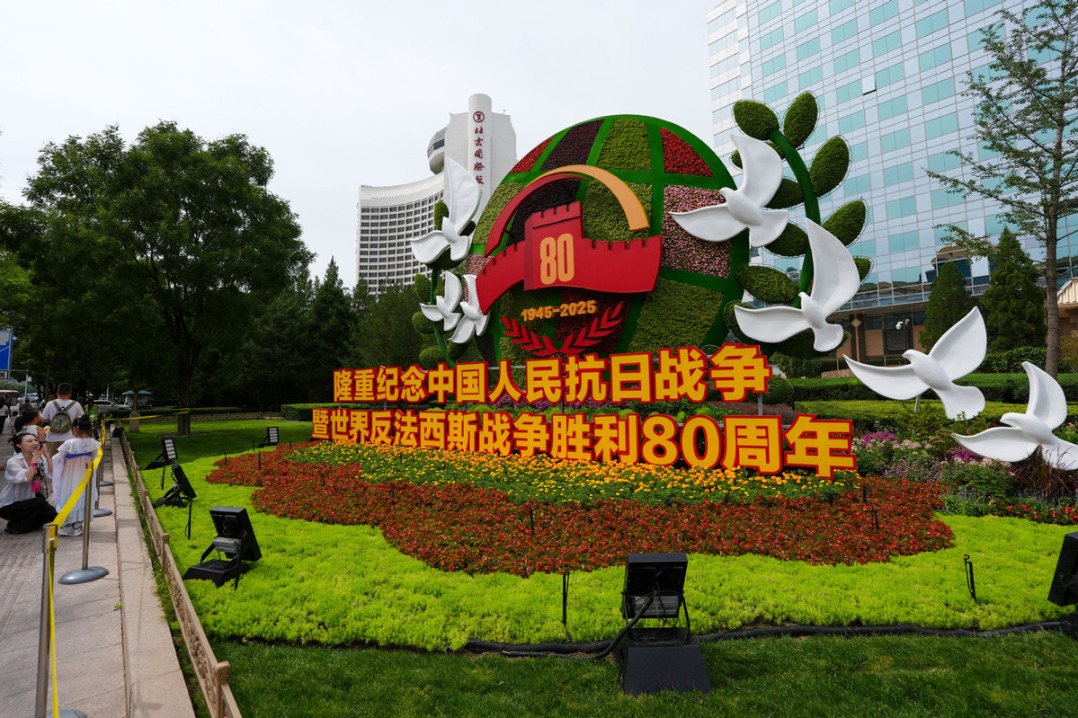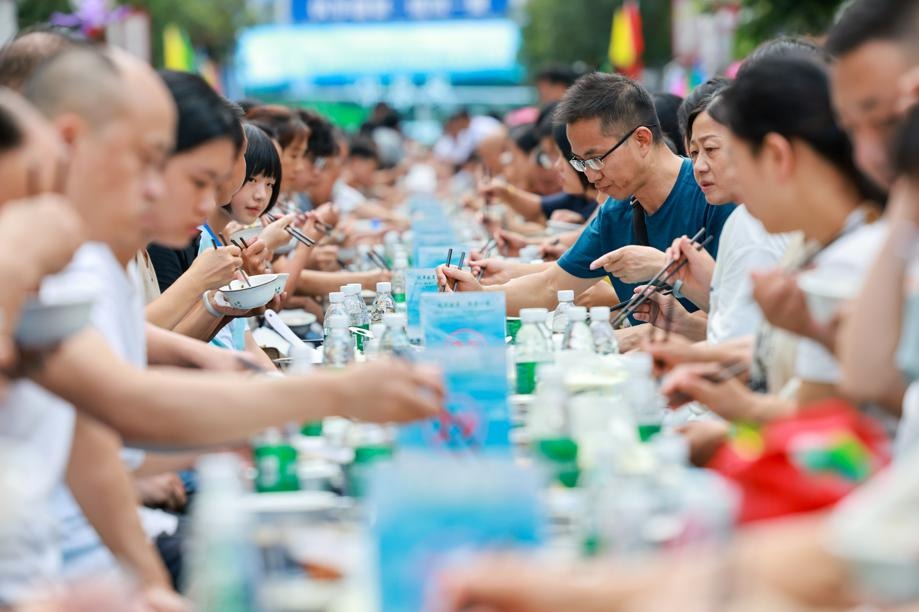TCM on the cusp of a world breakthrough

A Hong Kong scientist's quest for medication to treat refractory constipation has paid off, with a new oral TCM drug given the nod for a clinical trial by the US Food and Drug Administration. Atlas Shao reports from Hong Kong.
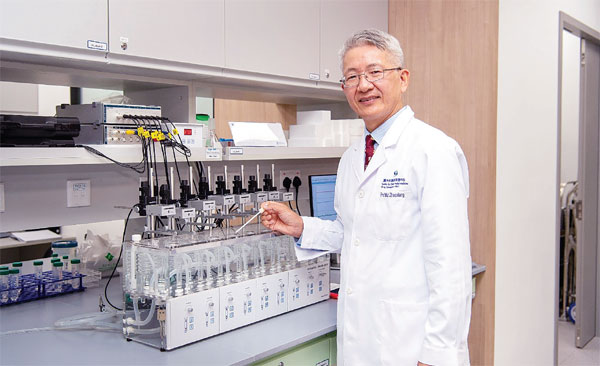
In the coming years, about 1.1 billion people suffering from refractory constipation, or 14 percent of the world's population, will have a Hong Kong scientist to thank, for ending their longstanding torment and daily frustration while going to the toilet.
CDD-2101 - a compound of traditional Chinese medicine developed by Bian Zhaoxiang, associate vice-president (Chinese Medicine Development) of the Hong Kong Baptist University, and his team to treat refractory constipation - has been granted clinical trial approval by the US Food and Drug Administration.
It's the first ever TCM drug developed in the special administrative region to have got the nod from the FDA for a clinical trial. Through their basic and clinical research on constipation with ma zi ren wan, also known as "cannabis fruit pill", Bian's team found that the TCM compound is more effective at treating constipation than existing therapies, which rely mostly on Western medicines.
"TCM has a long history of treating constipation. TCM compound medicines have shown great effectiveness in the clinical treatment of constipation. However, it's yet to be widely recognized by the international market," says Bian.
The FDA's approval for the TCM compound's clinical trial marks a significant step toward the internationalization of TCM development in Hong Kong, indicating that TCM usage will become more widespread, he says.
Greatly encouraged by the FDA's approval, Bian said it's also recognition of the SAR's research on, and development of TCM drugs and a morale booster for TCM practitioners.
The breakthrough in TCM's global promotion marks a milestone in Bian's lengthy professional career that started as far back as 1988.
Constipation is widely seen as posing a challenge to the medical profession, and many of Bian's patients have expressed dissatisfaction with existing treatments.
The new CDD-2101 drug, which is available in the form of granules, powder or for oral administration, is extracted from six types of Chinese herbs.
In the United States, Chinese medicine is typically categorized as "food additives". However, once TCM has secured approval as a medication, it can be prescribed by doctors at clinics and hospitals. This transition from dietary supplement to pharmaceutical product will boost public confidence in TCM and promote its wider usage.
In the second half of this year, the first phase of the new drug's clinical trial will be conducted in the US. It's expected to be completed by the end of 2024. Bian expects the drug to get FDA approval for entering the US market after the third phase of the trial.
According to Bian, three core aspects - efficacy, quality control and safety - are key to gaining the FDA's approval. Besides, quality control poses the greatest challenge in the productization of Chinese herbal medicine.
"For example, the drug's effectiveness may vary with the composing herbs probably coming from various places and being collected differently," explains Bian, who also heads Hong Kong's sole TCM drug development facility - the Centre for Chinese Herbal Medicine Drug Development, founded by HKBU with the support of the Innovation and Technology Commission.
CDD-2101, a key invention of the center, is a major project among health ventures undertaken by InnoHK - the city's incubation platform aimed at transforming the SAR into a global innovation powerhouse.
With CDD-2101, the center formulated a special standard to ensure the drug's safety by working with scientists from Chicago in the US, and the Macao Special Administrative Region. A set of 12 indicators were selected for quality control, ensuring the consistency of efficacy across different batches of the herbs.
Bian says the research and development of Chinese medicine is based on scientific principles. It involves a series of experimental evidence, toxicity experiments and clinical research, which goes beyond the traditional notion of being purely theoretical. CDD-2101, for example, can be applied to tumor patients to alleviate bowel problems from illness to surgery. This shows that TCM and Western medicine are not contradictory.
Bian said he hopes the clinical trials bring out the clinical effectiveness of the drug on people of different races.
A TCM forerunner in Hong Kong, Bian has not just paid lip service to his lofty goal of promoting TCM during three decades of medical practice.
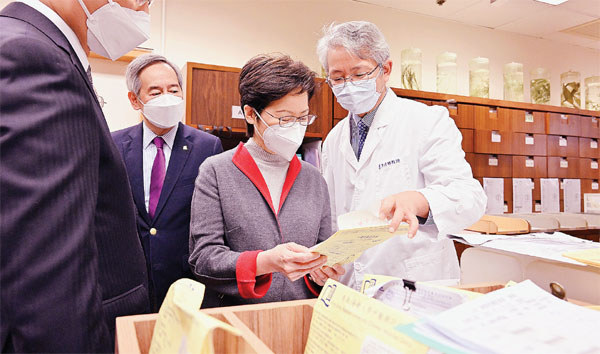
Frontline fighters
During the COVID-19 pandemic, which gripped Hong Kong for more than three years, Bian led a team of TCM doctors to fight the disease at Kai Tak Holding Centre and took care of COVID-19 patients with mild symptoms. Bian and his team, sent by HKBU, were tasked with handling 400 patients, who were given TCM drugs.
HKBU has also been commissioned to run the city's first TCM hospital now being built. It will provide 400 beds and is expected to open in the second quarter of 2025. The TCM-centered hospital will also offer Western medicine as supplementary treatment, covering internal medicine, external medicine, gynecology, pediatrics, orthopedics and traumatology, acupuncture and moxibustion, as well as special disease services and rehabilitation. It's expected to handle 310,000 patients annually when fully commissioned.
TCM has long been part of Hong Kong people's way of life. During the 2003 SARS outbreak, TCM played a significant role in treating patients. Hong Kong set up 18 Chinese medicine clinics in each of the city's 18 districts through collaboration among universities, the SAR government, and NGOs. This expanded the scope of TCM practices and brought Chinese medicine healthcare services to a wider population.
Using TCM to combat COVID-19 in the past three years has also greatly strengthened the overall awareness of TCM in the community.
Tony Ko Pat-sing, chief executive of the Hospital Authority, said TCM experts from the Chinese mainland had brought valuable experiences to Hong Kong during the pandemic. The Hospital Authority has since invited three senior Chinese medicine experts to the SAR through the Greater Bay Area Healthcare Talents Visiting Programmes, which have successfully trained more than 30 local Chinese medicine practitioners at seven public hospitals.
He said standardized treatment protocols for collaboration between Chinese and Western medicine have been established, and the HA hopes to expand stroke treatment to all seven hospital clusters during the current fiscal year, as well as the scope of treatable conditions to include cancer treatment, respiratory patients and acupuncture therapy.
Bian says he has seen a greater focus on TCM in Hong Kong since the COVID-19 outbreak, adding that the Guangdong-Hong Kong-Macao Greater Bay Area is actively involved in TCM research and development.
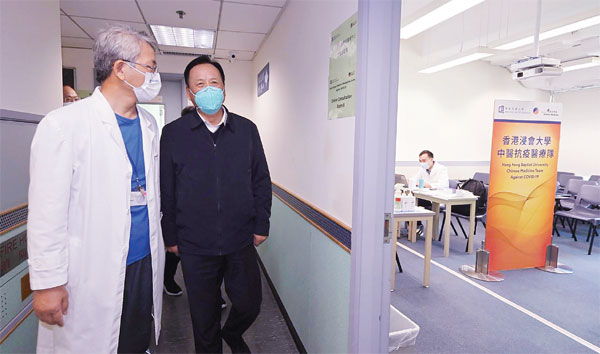
Unlimited potential
He says TCM development at universities in the Greater Bay Area is vested in two fronts. The region has the combined strengths of Hong Kong, Macao and Guangdong province and TCM, carrying the Chinese philosophy and the symbol of traditional Chinese culture. It also caters to the needs of an aging population by providing daily and preventive care to the public.
Hong Kong, with the nation's strong support, and the city's trump card as an international gateway, can contribute to the internationalization and promotion of TCM, says Bian.
TCM has a deep history in the city. In 1998, then-chief executive of the HKSAR, Tung Chee-hwa, proposed turning the city into a TCM port. HKBU launched Hong Kong's first undergraduate education in Chinese medicine the same year, followed by the Chinese University of Hong Kong and the University of Hong Kong.
These advantages have given Hong Kong - a key pivot along the Belt and Road Initiative - a pathway for promoting TCM internationally.
TCM has also seen significant development in many countries, including Australia, Germany, South Korea, and on the African continent. Hence, the development of TCM in the Greater Bay Area will not only benefit the region, but the whole country, countries involved in the Belt and Road Initiative and the world, says Bian.
There are six Chinese medicines on the Chinese mainland that have passed the FDA's Investigational New Drug application. However, no Chinese medicine has passed the FDA's New Drug Application as yet.
"Everyone is closely watching CDD-2101's application progress. If it ultimately obtains NDA certification, it will be a milestone," says Bian. Once approval is obtained, many countries are expected to follow suit in contributing to the international application of Chinese medicine. However, the development of new drugs probably takes four to five years.
Despite his busy schedule, Bian tries to see as many patients as possible. Sometimes, that could be up to 30 patients in a half day. The TCM doctor is always delighted to see the fruits of his labor and, most of all, his smiling patients.
Contact the writer at atlasshao@chinadailyhk.com
Bian Zhaoxiang's career highlights
? Associate vice-president (Chinese Medicine Development) of HKBU
? Director of Centre for Chinese Herbal Medicine Drug Development Ltd (supported by the Innovation and Technology Commission)
? Director of Hong Kong Chinese Medicine Clinical Study Centre
? Director of EQUATOR China Centre
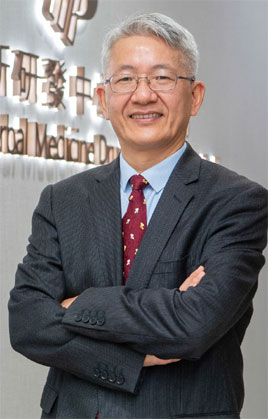
Education and career trajectory
? Joined Hong Kong Baptist University in 2001 under the Quality Migrant Admission Scheme of HKSAR
? Started seeing patients independently from 1991
? Guangzhou University of Traditional Chinese Medicine - Doctorate in Integrated Chinese and Western Medicine
? Beijing University of Traditional Chinese Medicine - Master of Philosophy (Chinese Medicine)
? Nanjing University of Traditional Chinese Medicine - Bachelor of Science (Chinese Medicine)
Research focus
? Clinical and clinical basic research on intestinal flora and gastrointestinal diseases
? Clinical trials of Chinese medicines and clinical trial report specification
? New drug development based on Chinese herbal medicine and its active fraction for digestive diseases
Key achievements
? As of August 2021, Bian had registered nearly 80 patents, and presented and/or published more than 500 papers in journals, books and at conferences. In collaboration with researchers at the Chinese University of Hong Kong, he led a research team that developed a new herbal medicine for IBS. In 2014, the NMPA of China granted a clinical trial license for the drug. In 2016, the formula was licensed as a drug company.
? 2nd Award, 2018 International Award for Contribution to Chinese Medicine-achievement Award in Medical Science, World Federation of Chinese Medicine Society (2018)
? Golden Award, 46th International Exhibition of Inventions Geneva (2018)
? 2nd Award, National Science and Technology Award of China 2001
? Science and Technology Award (1st Class), China Association for Traditional Chinese Medicine, China (2013)
? Research Award (2nd Class), 4th Internal Conference of Integrated Digestive Disease, World Association of Chinese Medicine (2013)

- China's anti-fascist war to be retold through words of Western correspondents
- Fuxing Island to host 2025 Shanghai Urban Space Art Season
- Flight ban call after drones collide above iconic Shanghai skyscraper
- Officer shines as a leader who treats his soldiers like an elder brother
- Businesswoman accused of corruption extradited back to China
- One day in Taicang: Play apprentice, be a local


















